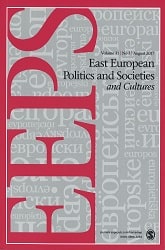External Actors and Regime Change: How Post-Communism Transformed Comparative Politics
External Actors and Regime Change: How Post-Communism Transformed Comparative Politics
Author(s): Milada Anna VachudovaSubject(s): Government/Political systems, Comparative politics, Post-Communist Transformation, EU-Approach / EU-Accession / EU-Development
Published by: SAGE Publications Ltd
Keywords: comparative politics; democratization theory; party politics; European Union; EU enlargement;
Summary/Abstract: This article explores how the study of post-communism has transformed comparative politics by adding a substantial role for external actors to existing theories of democratization. The big, overarching finding is dramatic: external actors can, under certain conditions, tip the balance in favor of democracy by offering strong rewards to elites, conditional on complying with tough requirements. External actors can also influence the performance of the state—and how the state treats its citizens. The main causal player is the European Union. This simple finding is consequential for all three major strands of democratization theory. The article goes on to explore how the leverage of the European Union has shaped the trajectories of political change in the new and credible future EU members in East Central and South Eastern Europe. The great variation among existing and candidate members can be largely explained by different domestic conditions, even though there are many areas where the EU’s use of its leverage could have been improved.
Journal: East European Politics and Societies
- Issue Year: 29/2015
- Issue No: 02
- Page Range: 519-530
- Page Count: 12
- Language: English
- Content File-PDF

